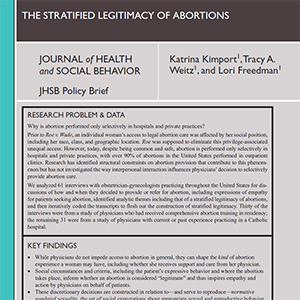 Why is abortion performed only selectively in hospitals and private practices?
Why is abortion performed only selectively in hospitals and private practices?
Prior to Roe v. Wade, an individual woman’s access to legal abortion care was affected by her social position, including her race, class, and geographic location. Roe was supposed to eliminate this privilege-associated unequal access. However, today, despite being common and safe, abortion is performed only selectively in hospitals and private practices, with over 90% of abortions in the United States performed in outpatient clinics. Research has identified structural constraints on abortion provision that contribute to this phenomenon but has not investigated the way interpersonal interaction influences physicians’ decision to selectively provide abortion care.
We analyzed 61 interviews with obstetrician-gynecologists practicing throughout the United States for discussions of how and when they decided to provide or refer for abortion. We found that, while physicians do not impede access to abortion in general, they can shape the kind of abortion experience a woman may have, including whether she receives support and care from her physician. Moreover, social circumstances and criteria, including the patient’s expressive behavior and where the abortion takes place, inform whether an abortion is considered “legitimate” and thus inspires empathy and action by physicians on behalf of patients. We argue that these discretionary decisions are constructed in relation to—and serve to reproduce—normative gendered sexuality, the set of social expectations about appropriate sexual and reproductive behavior and responsibility to which women are held accountable.
By inserting social criteria into medical decision making, the narrative of a stratified legitimacy of abortions weakens the claim, popular among abortion rights supporters, that abortion care decision making requires medical expertise. This opens the door for legislators and voters who lack medical knowledge to nonetheless claim authority to regulate and restrict abortion through recourse to social knowledge. Such efforts, as well as the narrative of stratified legitimacy itself, however, are likely to further marginalize already vulnerable women—particularly low income women and women of color—whose lives, behaviors, and pregnancy circumstances less frequently meet the social criteria for a legitimate abortion.
Read the publication, titled, "The Stratified Legitimacy of Abortions," and the accompanying policy brief, on the Journal of Health and Social Behavior's website (requires subscription).
